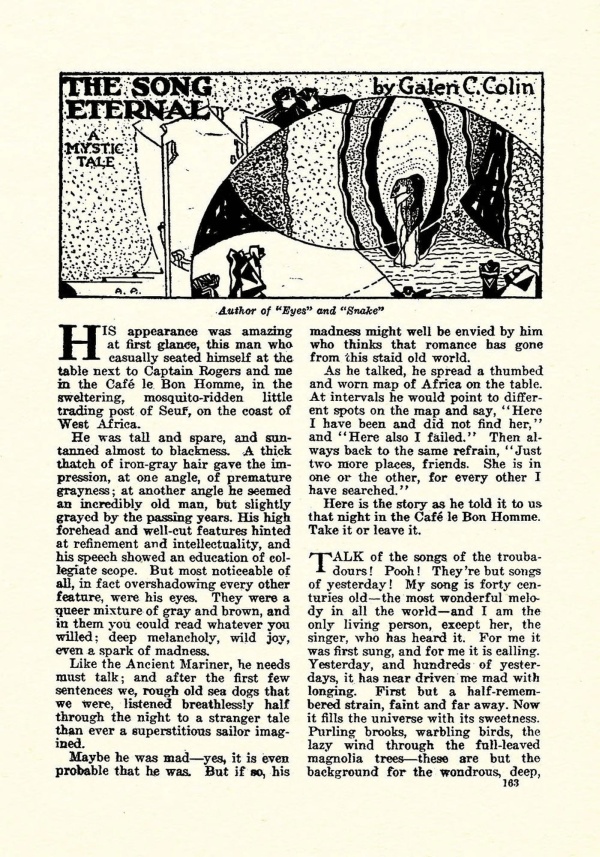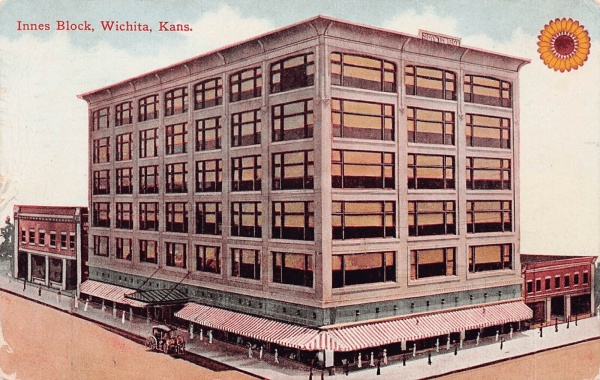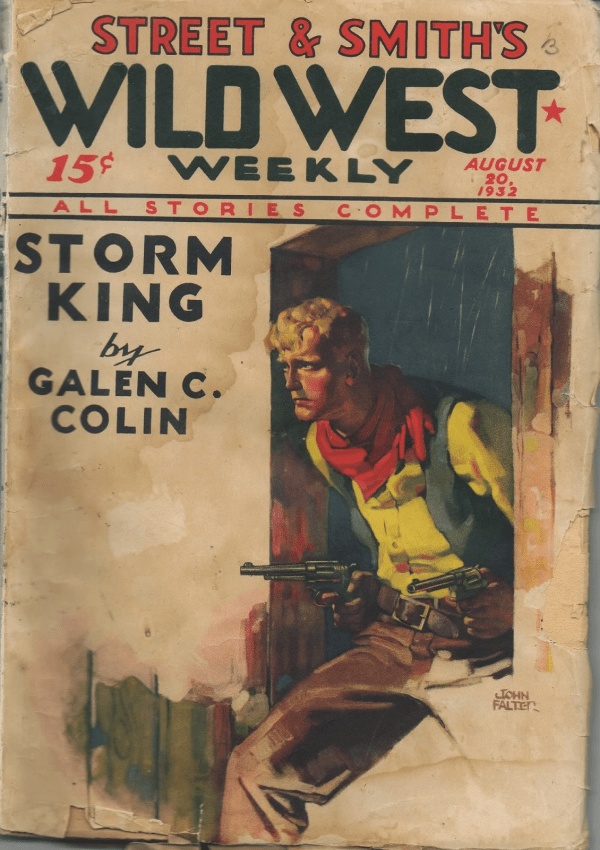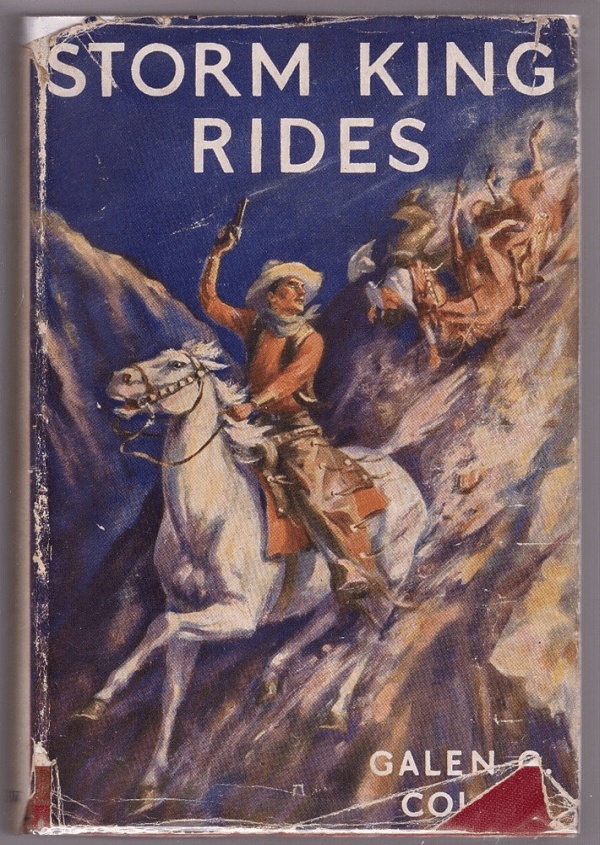This profile of Galen C. Colin, prolific writer of westerns for Wild West Weekly, appeared in the Wichita Eagle in 1932. Colin started out as an author of weird tales, moved to the western genre soon after and stayed with it for over twenty years. During that time, he published over 350 stories, of which 277 appeared in Wild West Weekly.
A brief bio of Colin was published earlier in the Tellers of Weird Tales blog.
WRITES IN SPARE TIME
WHEN the next issue of Wild West Weekly, one of the numerous popular magazines which feature western stories, appears on the news stand next Wednesday, it will feature a cover, and leading story by a Wichitan.
The title of the story, a novelette, is Storm King. The author is Galen C. Colin, advertising manager at the Innes Dry Goods company, whose success as a writer of short stories dealing with the old West has made his name one of the best known among authors of his class in the United States.
The story Storm King is the first of a series of six novelettes, each averaging 15,000 words in length, which are to appear in succession in Wild West Weekly. When completed the novelettes will comprise a single book, 90,000 words long, which is to be published in book form and be placed on the market early next year, according to present plans.
Started by Accident
Those thousands who have already formed a taste for the writings of Mr. Colin will find the coming novelette one of the best he has written. Starting in 1928, the Wichitan has published more than 300 stories, including 25 novelettes.

He does not know exactly how he started writing, but one day he wrote and sold a story to Weird Tales, then the only magazine dealing with the macabre and pseudoscientific on the market. It was the beginning of a career.

From that time on, Mr. Colin says, he was driven by an insistent desire to write, write, write. He wrote a number of other stories of the Weird Tale variety, sold some and had others rejected. One day on a magazine counter, he noticed something which changed his entire viewpoint on writing.
“I BEGAN counting magazines,” he says. “When I got through, I found that there were exactly 14 magazines on the racks which were featuring western stories. And there was only one featuring the type of weird stories I was trying to write. In other words, the market for western stories was exactly 14 times as great as the market for weird stories. I made a quick decision. Gathering up an armful of the western stories magazines, I took them home and spent a long evening reading, studying, and appraising them. When that was done, I went into the business of writing western stories in a big way.”
That was in 1928. At first the business of writing salable stories was difficult. He had many a rejection slip before he began to place his stories with fair regularity. Today, however, he is conversant with most of the tricks of his profession—and he is a skillful workman and as such is sought after by the western story magazines.
Hard Work to Write
If anyone is of the opinion that the life of a writer is full of ease, Mr. Colin can quickly disabuse him of the idea. It takes hard, patient, unremitting work to write. The Wichitan denies that he has any “writing habit” such as some writers claim. He sets no daily stint.
“Fortunately for me, however. I am in a position where I have a lot of writing that I simply have to do. Because I am always behind in my production, I find that I do a lot of writing. So far this year, for example. I have written 280.000 words.
“I think that every writer is lazy. It is fun to think out your plots and situations, to paint in your mind’s eye the characters you wish to portray. But the actual writing is work —real, hard. work. And nobody can do it for you. You just have to sit down and grind it out for yourself.
“I DO all my writing at night. I have my typewriter out home, and when I finish my work at night, I can sit down and turn out manuscript whenever I want to. My family is trained so that I am left severely alone when I am writing. That is a big help, because I do not believe it is possible to concentrate when you are being constantly interrupted and sidetracked by household annoyances.
“Of course I do not spend every night writing. I may write with a great deal of vigor one night—perhaps turn out a full 6,000-word short story. Then I may skip a night or two. But I have to keep at it pretty consistently.”
During the day time Mr. Colin holds down the exacting job of handling all the advertising for Innes, one of Wichita’s biggest commercial enterprises. That he handles it efficiently goes without saying. And that to do so requires all the thought, originality and hard work that a man can put into a full 8- hour day, also goes without saying. This is what makes his record as a writer all the more remarkable.

After a Hard Day’s Work
Most writers do little or nothing else. But the Wichita man does none of his writing until after he has completed a full day’s work. That is the time most men look for relaxation. They plan to attend a theater, go driving, play bridge, or do something else to rest the old bean. But not he. When he goes home, he plans to do the hardest and most exacting of brain work— creative writing. And he is making it pay big returns.
The novelette “Storm King” will introduce a new character to the world of western stories. An emigrant family is going west to take up a homestead. As it moves with its covered wagons slowly through the mountains, a terrific storm breaks out. With the rain pouring down in sheets and the constant trashing of the lightning playing an earsplitting accompaniment to the roar of the waters, the emigrant family takes shelter beneath a huge overhanging rock.

A gang of bandits, which lurks in the canyon for the very purpose of murdering and robbing travelers like these, takes advantage of this moment to ride down on the wagon train. The father, mother and others in the train are slaughtered, and all of value in the wagons is carried away. In the rush, however, one little life is overlooked. A tiny baby is not killed.
One member of the bandit gang. Brad King, has only recently joined it, and the spectacle of the wanton murders so sickens him that he resolves to quit. The next day he leaves the gang, and on passing back by the now deserted wagons, he finds this little baby.
Brad King takes the child with him and rears it as his own. Shortly after the robbery, the other members of the gang are rounded up and finally sentenced to 20 years apiece in the penitentiary. They believe that King furnished the information against them and vow vengeance.
Seeks Revenge
The story then veers to the time, 20 years later, when the bandits are released. Brad King is aging and the baby has grown to be a man. He has been named Storm King by his foster father, and he has been brought up on the range, so that he has all the hard-riding, quick-shooting qualities of the time and locality. The bandits, gathering after their release from prison, treacherously killed Brad King.
Just before he dies, however, he tells Storm the truth about his parenthood and gives him the names of the men who were guilty of the murders of his parents. The boy goes out to seek revenge. There follows a series of swift, climactic incidents as Storm King wipes out the score.
